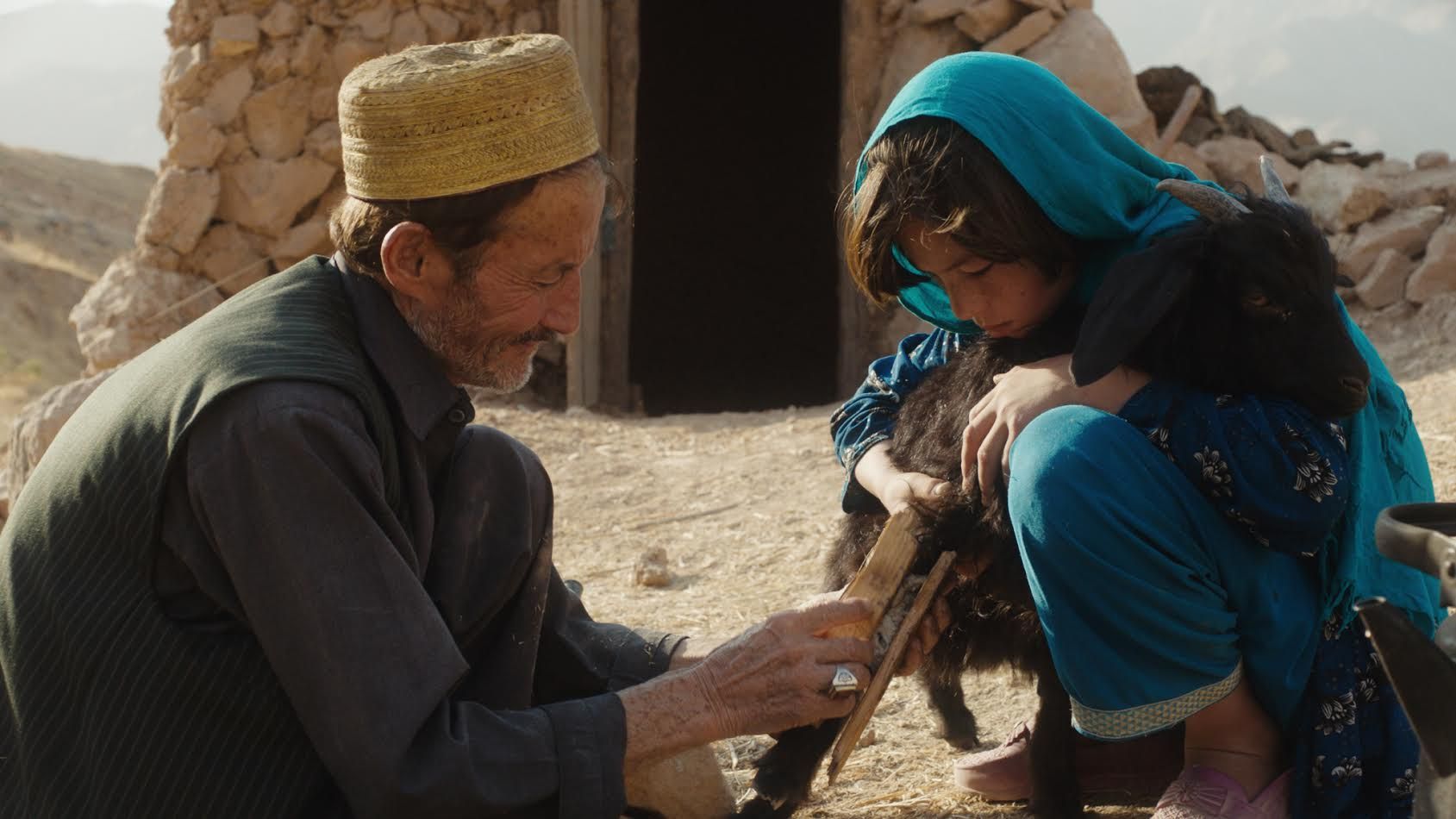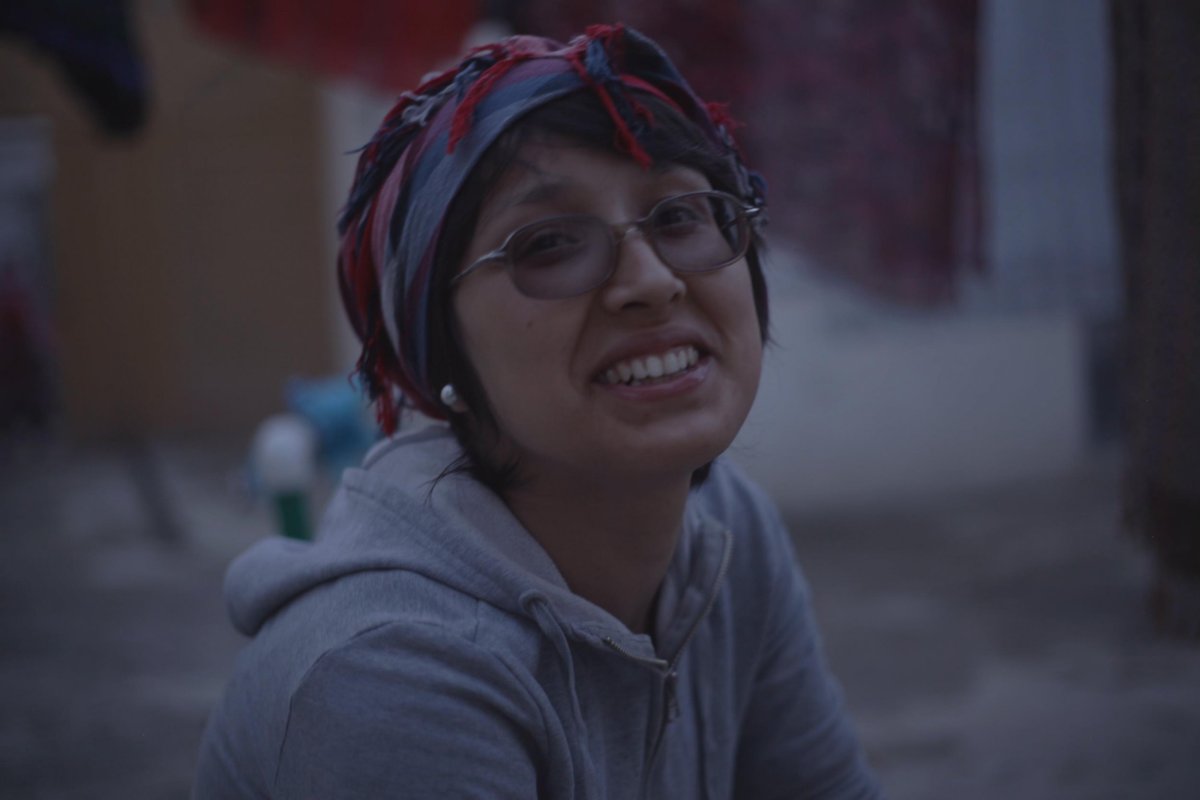
Shahrbanoo Sadat, a young Afghan female scriptwriter and director, prefers the status of women in stories to the status of women in reality.
Agreeing with former British prime minister David Cameron's assertion that Afghanistan is "fantastically corrupt," she says that "culture and cinema have no place in the country" and men run things like the mafia.
And yet, 26-year-old Sadat has defied the odds to create Wolf and Sheep, a story of rural Afghanistan where everyone is a storyteller and children rule the hills as shepherds.
The film took eight years to make, after initially being developed with the Cannes Cinefondation Residency in 2010. Sadat was just 20 years old, the youngest ever selected.
Eventually, Wolf and Sheep screened at the BFI London Film Festival and is now available via iTunes. Newsweek spoke to Sadat about life for Afghan women and the obstacles she faced during filmmaking.
Why did you decide to set the film in remote, rural Afghanistan?
The story is based on my best friend's childhood and mine. We both grew up in the same village—a small and isolated village somewhere in central Afghanistan, but not at the same time. I lived there between the years 2001 and 2008 and he was living there between the years 1972 and 1980. We experienced quite the same thing. We both were outsiders, unable to communicate with other kids. In 2008, when we met for the first time and we talked about our village, it looked like we were living at the same time—nothing had changed there that much. In Wolf and Sheep, I tried to make a fictional time when we both lived at the same time, meaning we could be friends, even for a very short time.
The words "blame" and "guilt"—in relation to women—are used in the first few minutes of the film. What is the significance of this? Do Afghan women carry a burden that Afghan men do not?
I think the status of women in a society like Afghanistan is very clear. Women always stay somewhere down and in the shadow; they are invisible. Women accept their situation as it is. I remember the time I was living in the village, everyone was talking about two women, Sima Samar, the head of Afghan Independent Human Rights Commission and Habiba Sarabi the governor of Bamyan. Women made many jokes about them, they couldn't understand the concept of equality between men and women. They do believe that God created women from the men and women must follow the men for their entire life because women have half of the brain that men have. I mean, every discrimination looks very normal in rural Afghanistan, as well as in Kabul, because people have not enough knowledge. They think it's completely normal the way things are at the moment.
What significance does the tale of the Kashmir wolf, the fairy, and the idea of God giving love and then taking it away, have on the story you are telling?
The Kashmir wolf story is based on a true story. Many years ago, during the time of the king, the British helped him to make a plan to kill leaders of other ethnicities including Hazaras—the biggest outsider and least popular ethnicity who lived colony in central Afghanistan—so they could keep the power for longer. The king sent his men to kidnap and then kill the Hazaras' leaders. His men put wolf skin on and kidnapped people from their bed and killed them later. Central Afghanistan had fame for being dark and for the wolves living there. They were the two biggest dangers—darkness and wolves. Some nights, some people saw a wolf walking on two legs in the darkness. They had no idea what was happening around them and why some people were disappearing.
They start to invent stories to explain things they didn't understand. They made hundreds versions of one story as they are uneducated and no one ever write these stories down, so the stories are only verbal. Anyone who tells it to someone else has the freedom to change, edit, add things to it. I have heard many versions of Kashmir wolf story but the one I liked most was that in reality, the Kashmir wolf is a green fairy. I was impressed of how Muslims and conservative and religious people have this freedom in their fantasies when they are making up stories. They have to cover themselves up all the time, but they are telling stories of a naked green fairy walking around.
In the stories, women are very powerful and people are scared of them because they are kind of supernatural beings. I like the status of women in the stories and tales more than the status of women in reality.
When the man talks of God giving love and then taking it back...well, there is always a moral aspect to every story in Afghanistan. People want to put the message of the story somewhere. Of course, the message always has something to do with religion.
As a young woman, do you think you have had to work harder to get your voice and your work heard?
Sure, as usual. This is something universal. Women always have to work harder—it doesn't matter where you are; in Afghanistan or in any other country.
As a young woman, I always have to deal with patronizing behavior. Afghan cinema community is a mafia and this is not my opinion, it's a fact. David Cameron called it a fantastically corrupted country and I think he is damn right. They are super corrupted. They are a circle, a specific number of people who are scared of any new face who is not part of them. I'm a woman, I'm young and I have nothing to do with their circle—I am done! They use any possible way to silence new voices. For them it's not about talent. Even if I work harder and I have achievements, they don't want to see it, because they close their eyes on purpose, not only because they can't but they don't want to see. I think the only way is working independently and being more connected to the cinema industry outside of the country and making films and never, ever giving up. Making good films is the best answer to them.
I have to say, it was refreshing to see a film about everyday life in Afghanistan. Was this a conscious and important element to your film? That it didn't paint either a very negative or a very positive picture?
Yes, it was. I always wanted to make a film about everyday life and routine in rural Afghanistan, where I grew up. I am very interested in small stories and I think these small stories that look like they don't talk about anything, they actually talk about many important things. For me studying the daily life of Afghans lead me to understand the community and the society much better. I always look for the roots of problems. The way people talk, and treat each other, the way they behave and react, things they believe...
How much of a struggle was making this film? What obstacles did you face?
It took eight years for me to make this film. This was because of many reasons but the biggest was because I wanted to shoot the film in my own village. We had to postpone the film because of the election in 2014, and finally we reached a point where it became impossible to shoot the film in Afghanistan as I had my international crew. There were a lot of security issues. I wanted to make a very simple film about everyday life in Afghanistan and it turned out to be very complicated to make it. We didn't want to put the life of any our crew in danger.
For me it was a very difficult decision to shoot the film somewhere else. I came from cinema verité where everything is based on reality and truth. It was suicide to shoot the film outside of its true location while the story depended on so many small things that could so easily be lost by not shooting in the real place.
Finally, we had to recreate the Afghan village in Tajikistan and I took my Afghan non-actors from their small village in central Afghanistan. It was the first time they left their village. I took national IDs, passports and visas for them but Tajikistan authorities didn't want to accept visas for Afghan citizens. The Taliban took some parts of northern Afghanistan, where there is a border with Tajikistan, and they were very tight on security. Every single step was a challenge.

What are the filmmaking opportunities for women in Afghanistan?
Zero. Not only for women but also for men. Our cinema industry—if I can call it an industry—is poor in every sense of the word. No creative movements, no clue of concepts, no clear vision…You have to either manage to get an amount of money from a cultural part of an embassy or go to a festival and use the opportunity to get out of the country and apply for asylum. Culture and cinema have no value in Afghanistan. The situation of the country is proof for what I am saying. I hope little by little a new generation blooms; one that has ideas and, even more importantly than that, has dreams, and want to change things around them.
The children in the film, especially the boys, use harsh language. What significance does this have?
This is the way they talk in everyday life. I never gave them a script, I only told them a few sentences before shooting each scene about the situation and some hints about the general concept of the scene. They had the full freedom to talk the way they talk all the time. For me it was very interesting the first time someone asked me the same question as you. I said, really? Was it harsh? Because I didn't want to make it harsh—I just wanted to keep it real.
Daughters are referred to as "money" and when a boy loses his eye, his father immediately discusses compensation in the form of a bull. What significance does this theme of the story have?
Animals, farms, lands, houses…they are values in rural life. People divide off into different classes based on these values. It's very normal to ask as an animal for compensation or, for example, when a girl is going to get married, is very normal for her parents to ask for a flock of sheep, and a goat, or a few cows and a bull, depending on the richness of the family of the groom. It's a fact of their life.
Uncommon Knowledge
Newsweek is committed to challenging conventional wisdom and finding connections in the search for common ground.
Newsweek is committed to challenging conventional wisdom and finding connections in the search for common ground.
About the writer
To read how Newsweek uses AI as a newsroom tool, Click here.








